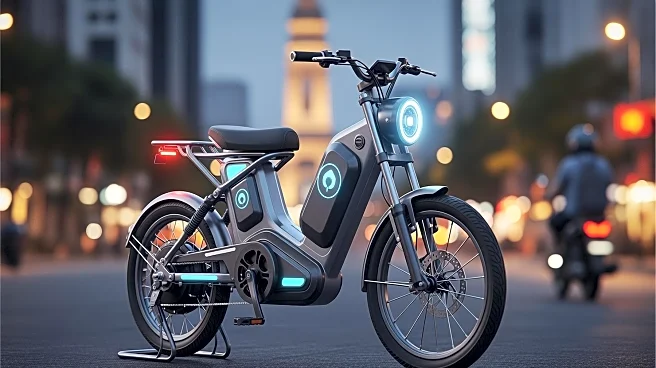What's Happening?
Vietnam is undergoing a significant transition from gas-powered motorbikes to electric vehicles as part of a national effort to reduce emissions and air pollution. The government plans to ban fossil-fuel
motorcycles in Hanoi's city center by July 2026, with a broader goal of having a third of cars and over a fifth of motorbikes running on electricity by 2030. This shift is driven by the need to address the high levels of air pollution, which are linked to approximately 70,000 deaths annually in the country. Despite the push for electrification, there is resistance from major motorbike manufacturers like Honda and Yamaha, who argue that the timeline is too ambitious. Meanwhile, electric vehicle companies such as VinFast and Dat Bike are expanding their operations, supported by government subsidies and incentives.
Why It's Important?
The transition to electric bikes in Vietnam is significant for several reasons. It represents a major step towards reducing air pollution and improving public health in a country where motorbikes are a primary mode of transportation. The shift also has economic implications, as it could boost local production and attract investment in the electric vehicle sector. However, the transition poses challenges, particularly for consumers who rely on affordable and reliable gas-powered bikes. The success of this initiative could serve as a model for other developing countries facing similar environmental and economic challenges. The outcome will impact various stakeholders, including manufacturers, consumers, and the government, as they navigate the complexities of this transition.
What's Next?
As Vietnam moves forward with its electrification plans, several developments are anticipated. The government will likely continue to offer incentives such as low-interest loans and subsidies to encourage the adoption of electric bikes. VinFast plans to establish 150,000 battery-swapping stations nationwide within three years, which could alleviate concerns about charging infrastructure. However, the resistance from major manufacturers like Honda and Yamaha suggests that negotiations and adjustments to the timeline may occur. The success of this transition will depend on the ability of electric bike manufacturers to produce affordable and high-performance vehicles that meet consumer needs.
Beyond the Headlines
The shift to electric bikes in Vietnam also raises broader questions about sustainable urban development and the role of government policy in driving environmental change. The initiative highlights the potential for electric vehicles to transform transportation in densely populated areas, reducing reliance on fossil fuels and improving air quality. It also underscores the importance of balancing economic growth with environmental sustainability, as the country seeks to modernize its transportation infrastructure while addressing public health concerns.











